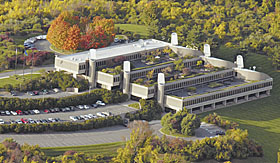For more archives, go to the Advance Archive/Search Page.
Health Center Expands With
Purchase of Building, 20 Acres
In search of additional space, the Health Center has shifted its campus boundaries south, with the acquisition of a five-story office building and 20 acres of land across from its academic entrance.
 |
|
A building on Munson Road, recently purchased by the Health Center, will allow room for expansion. |
|
Photo by Peter Morenus
|
The Health Center finalized the purchased of the 110,000-square-foot building and surrounding land along Munson Road to obtain more space for current operations and to allow for the anticipated growth of its clinical programs. The UConn Health Center Finance Corp. purchased the parcel for $12.4 million, which includes assumption of the current mortgage. Closing on the transaction took place Nov. 11.
The newly purchased building, which formerly housed Heublein Inc. and is visible from Interstate 84, will be used for office space for employees and activities currently located in the Administrative Services Building and in leased space in other sites off campus.
“This will allow us to consolidate operations that are currently scattered in several locations,” says Bruce Carlson, chief of staff for the Health Center. “It also allows us to convert the Administrative Services Building to clinical uses, which is particularly appropriate in light of its location next to the new Medical Arts and Research Building.” That building, now under construction and scheduled to open in mid-March, will house the Health Center’s Musculoskeletal Institute, a center for research and treatment related to orthopedics, arthritis, bone biology, biomechanics, and biomaterials, and a new ambulatory surgery center.
The newly purchased building is on property that is virtually contiguous to the campus, a location that allows for efficiency in shuttle service, security, and other support functions.
The Health Center is planning for significant growth in its cancer and cardiovascular clinical programs, which are currently in the Health Center’s Main Building, in locations that don’t allow for expansion. Moving clinical operations to the Administrative Services Building frees up space in the Main Building for growth of the signature programs, says Dan Upton, chief financial officer. Other clinical programs, like urology, ophthalmology, neurosurgery, dermatology, and otolaryngology also need more room to accommodate growth.
“Most importantly, we can develop clinical ‘swing space’ that will allow us to move services to other places while we renovate those areas,” says Upton, “and minimize disruption to our patients and staff.
Turning the Administrative Services Building into clinical space advances the Health Center’s strategic plan, which calls for centralizing all ambulatory clinical activities on the lower campus.
With the purchase of the building, the Health Center also obtains about 450 additional parking spaces, more than the number needed to accommodate the building itself, and enough to help ease the chronic parking crunch on the main campus.
Building owner Michael Konover agreed to donate to the Health Center the office furniture currently on the first and second floors of the building, which was valued at $2 million when it was purchased.
“We reviewed a number of options for additional space in the Farmington area,” says Upton, “and determined that the Konover Building was the most advantageous choice because of price, location, building condition, and the donation of furnishings as part of the transaction. We can occupy the building immediately with little additional cost, particularly with the donation of furnishings.”
The current tenants of the building are expected to leave within the next several weeks, clearing the way for some modifications to the floor plan. Thomas Trutter, director of planning and construction, says Health Center employees will probably begin moving into the building in the spring.

